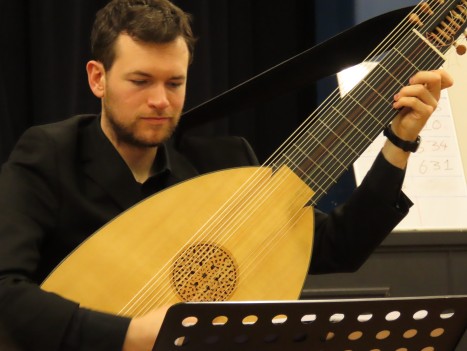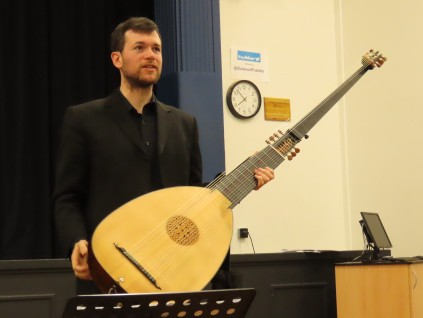Photo by Marian Pearson – more images below
‘Another fabulous concert in Scunthorpe – great to hear such exciting performers.’
‘I love the partnership between the recorder and theorbo – sensitive and uplifting.’
‘Tabea and Alex are wonderful. I didn’t know the recorder could be so thrilling! But truly it is.’
‘Imaginative programme, superb technique, beautiful playing. The concert of the season for me – if not for many years.’
‘I especially enjoyed the Caffeine, although I found myself holding my breath for what seemed forever’
Review by Clive Davies
Fearsome fault lines run the length and breadth of the globe, separating the
sheep from the goats, reds and blues, Roundheads and Cavaliers. There
may be yet another invisible divide, between those who suspect that the
theorbo is a small bone not unadjacent to the coccyx and those who know it
to be a stringed musical instrument.
Members and visitors to the Scunthorpe and North Lincolnshire Concert
Society know the answer to the question after close and personal contact
with a theorbo played by Alex McCartney. They know, too, that this venerable
member of the lute family, distinguished by an ample and glossy belly and an
impossibly long neck, produces music of mellow and distinctive beauty.

The lutenist came to the Outwood Academy, Foxhills, to appear with the
virtuoso recorder player Tabea Debus in a programme featuring both
instruments, alone and in combination. It appears that this was the first time
in the society’s 70-year history that this pairing of instruments had had been seen and heard – which prompts the thought that it would be abomination to wait for another
70 years before such uplifting piping and strumming is heard again.

Pieces presented ranged from the pre-Renaissance period, through the
heyday of Baroque and classical, extending to contemporary settings. There
was a unifying theme to the programme,as outlined by Tabea Debus in her
erudite and informative notes, and that was the search for the Earworm (der
Ohrwurm in German). This is the creature comprising songs, tunes, rhythms,
and fragments even, that become lodged in the inner ear and persist in
making music even after Lights-Out. Her thesis is that these particular worms
skip across borders and generations and have enormous powers of
persistence.

Both performers introduced their various instruments with attractive and
personable assurance. There were familiar names among the composers
(Purcell, Handel, Corelli) and others whose names deserve perhaps to be
better known. One novelty was a modern piece for solo recorder written by
Freya Waley-Cohen, called Caffeine. Seemingly this was composed on a
transatlantic flight, prompted by an earworm and sustained by servings of hot
coffee.
The quicksilver brilliance of the recorder and the stately pacing of the theorbo
combined beautifully to bridge the divide between ages and nationalities and
to produce music that was irresistible in its zest and vitality. For all the joyous
music served so pleasingly, and with such good humour, by Debus and
McCartney, it was difficult to ignore entirely that other earworm burrowing
inside the sensibility.
In the concert hall all was light and brightness. In the outside world darkness
has fallen and a nasty pestilence is gathering strength. Marquez wrote a
novel named Love in the Time of Cholera. His title can be adapted, and one
might want to give thanks for Music and Musicians in the Time of Virus.

